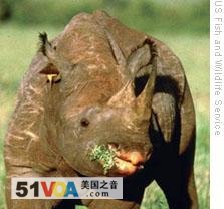Harare
21 July 2009
Zimbabwe's wildlife conservation reputation has taken a knock
in the past few years and there are fears the recent surge in the
poaching of the black rhino will lead to the animal's extinction in the
country. 
The Convention on International Trade in Endangered
Species [CITES] says there has been an increase in the poaching of the
rhino for its horn wherever the animal is found, but the situation is
particularly bad in Zimbabwe. VOA asked Raoul du Toit of the Lowveld
Rhino Trust, a rhino conservation organization what is driving the
poachers.
Du Toit says, "Part of it is obviously the national
situation in Zimbabwe where there is reduced law enforcement and part
of it is the growing demand for rhino horn, the growing Chinese foot
print in Africa, Vietnamese footprint in Africa and the fact that the
markets are now really fueling poaching in a very aggressive way."
The
rhino horn is believed to have medicinal properties in some Asian
countries where it is used as an aphrodisiac and in the Middle East as
handles for ceremonial daggers.
Du Toit added that Zimbabwe had
seemingly got on top of the situation when a similar surge in poaching
happened in the late 1980s and early 1990s. He said the rhino
population had actually increased, but all the good work is being
undone and the falling rhino numbers are once again a cause for great
concern. He put the number of rhino poached in Zimbabwe since 2006 at
as high as 250.
National Parks and Wildlife Management Authority
Director General Morris Mtsambiwa agreed the situation is a cause for
concern, but said an Emergency Rhino Protection Plan has been put into
place to counter the poachers. He says his department; the police, the
army and rangers from wildlife conservancies are involved in the
program, which he says has been successful.
He pointed to the
killing of six poachers since the beginning of the year as proof of
action being taken, but he said the country's economic problems are
hindering a more effective response to the poaching.
Mtsambiwa
says, "You can hear that poachers have come into an area and you want
to deploy whether by aircraft or by road but if fuel is not available
you have difficulties."
Organizations such as du Toit's Lowveld
Rhino Trust are also involved in the relocation of rhinos to areas
where it is easier to protect them.
Mtsambiwa said despite all
these efforts some Zimbabweans, including those in position of
authority, are involved in the poaching. He admitted some rangers from
his own department were arrested for their involvement.
A
recent article in The Standard, a local weekly newspaper said two
Cabinet ministers from President Robert Mugabe's ZANU-PF Party are
being investigated for poaching. The reports said Environmental and
Natural Resources Management Minister Francis Nhema admitted senior
ZANU-PF officials were implicated in the rhino poaching.
Lowveld
Rhino Trust's du Toit also blamed the courts for not being harsh enough
on those poachers captured alive for sentences to act as a deterrent,
but Mtsambiwa says his department is continually engaging judicial
officials and the situation is changing.
Mtsambiwa explains, "We
have just had fines for poaching rhinos increased to $120,000 from a
mere $1,500. You know when someone does not understand something, they
even put more weight than the endangered rhino so these are things that
we are explaining to them."
Du Toit and Mtsambiwa agree that
while the rhino gets most of the attention because it is endangered,
wildlife conservation in Zimbabwe in general is facing many
challenges. Du Toit said Zimbabwe once had what he described as a
proud record in conservation, but the country is compromising some of
its own principles.
He said wild dogs, which are also
endangered, are also under threat as they get caught in snares set up
by people hunting for meat. Of the animals that do not seem to be
attracting that much attention he singled out the zebra.
He
explains, "What we have seen particularly in southern Zimbabwe is
growing commercial poaching of zebra for their hide. Those hides are
smuggled across the Limpopo river to South Africa and marketed in South
Africa and exported from South Africa to European markets at pretty
high values."
Conservation groups also blame the settlement of
landless Zimbabweans in wildlife conservancies under the country's
land-reform program for the decline in wildlife conservation.
Mtsambiwa admitted this had caused problems, but it is now being
remedied.
Mtsambiwa says, "At the beginning of the land reform,
huge populations of wildlife were decimated as people moved in and they
were just killing wildlife wantonly. But now they are beginning to
understand the value and they are assisting in its protection."
But
Mtsambiwa cautioned Zimbabwe cannot deal with the poaching problem on
its own. To this end, he said, Zimbabwe is collaborating with other
countries in the region and beyond to ensure poaching is checked.